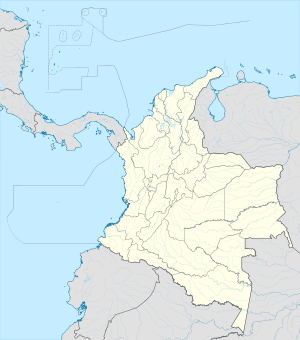Pitalito
|
Pitalito Guacacayo (River of the tombs) |
|||
|---|---|---|---|
| Municipality and town | |||
|
|||
| Nickname(s): Valle de Laboyos | |||
| Motto: "A better town, a municipality for everybody" | |||
 Location of the municipality and town of Pitalito in the Huila Department of Colombia. |
|||
| Location in Colombia | |||
| Coordinates: 01°52′N 76°02′W / 1.867°N 76.033°W | |||
| Country |
|
||
| Department | Huila Department | ||
| Founded | June 13, 1818 | ||
| Government | |||
| • Mayor | Miguel Rico | ||
| Area | |||
| • Municipality and town | 666 km2 (257 sq mi) | ||
| Elevation | 1,318 m (4,324 ft) | ||
| Population (2012) | |||
| • Municipality and town | 118,677 | ||
| • Metro | 69,395 | ||
| Demonym(s) | Laboyano | ||
| Time zone | Colombia Standard Time (UTC-5) | ||
| Area code(s) | 57 + 8 | ||
| Website | Official website (Spanish) | ||
Pitalito is a Colombian town and municipality located to the south of the Department of Huila, Colombia over the Valley of the Rio Grande de la Magdalena, 188 km from Huila's capital, Neiva. It is referred as "The Valley of Laboyos," and is also the second most populated municipality in the Department of Huila, with approximately 150 000 inhabitants. Pitalito is considered the largest producer of coffee in Colombia, where high quality coffee beans are cultivated. Being at the epicenter of coffee producing District of Bruselas, the town has become the new coffee-growing region of Colombia, . On several occasions, it has been awarded with the "Cup of Excellence", for producing the best coffee in the country.
Boundaries - North: Timana, Elias and Saladoblanco; South: Palestina; West: Isnos and San Agustin; East: Acevedo.
José Hilario Sierra, priest and doctor, was appointed priest of the vice-parish of "Los Laboyos' in 1818. That year, some of the residents of the vice-parish decided to build their houses on the site they called Pitalito, a picturesque region located two miles northeast of the Laboyos. Early settlers became attracted to the area because of the fertility of the soil, the mild climate and the abundance of water, as well as construction materials. Many other residents followed in the same year, resulting in rapid depopulation of the village of Laboyos, as almost all of its inhabitants moved to populate the region of Pitalito in the Cálamo estate, and contiguous to Solarte estate, where there were already more than two thousand cattle and horses.
The progressive doctor Sierra, seeing that his parishioners were dispersed, decided, under his Ministry, to follow them to Pitalito, where he built a little hut-chapel where he could administer the Holy Sacraments and celebrate Holy Mass. The Chapel, the first in in the area, was built on the same location where it still stands today at the Temple of San Antonio. In 1819, in front of the chapel, Dr. Sierra demarcated the square and the streets of the new town.
After three years, with the growing community, the new village had the need to have a mayor. Appointed to the post was Don Jorge de Cuéllar, son of Don Luis de Cuéllar, an important figure in the town of Timaná. Don Luis was one of the owners of the region and was of noble lineage, being the son of Don Jerónimo de Cuéllar, whose family originated in the kingdoms of Spain, in Andalusia's rich.
Colombia is the second largest producer of coffee in the world and the largest producer of washed and Arabica coffee. The country is well known for its high quality coffee and about half of its exports are sent to the United States. Colombia exports approximately 12.5 million bags and domestic consumption is about 2 million bags annually.
...
Wikipedia



